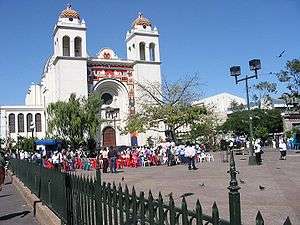Roman Catholic Archdiocese of San Salvador
| Archdiocese of San Salvador Archidioecesis Sancti Salvatoris in America Arquidócesis de San Salvador | |
|---|---|
 Catedral Metropolitana de San Salvador | |
| Location | |
| Country | El Salvador |
| Statistics | |
| Area | 3,295 km2 (1,272 sq mi) |
| Population - Total - Catholics |
(as of 2014) 3,137,000 2,322,000 (74%) |
| Information | |
| Rite | Roman Rite |
| Cathedral |
Catedral Metropolitana de San Salvador (Metropolitan Cathedral of the Holy Savior) |
| Current leadership | |
| Pope | Francis |
| Metropolitan Archbishop | José Luis Escobar Alas |
| Auxiliary Bishops | Gregorio Rosa Chávez |
| Map | |
 | |
The Archdiocese of San Salvador is the chief ecclesiastical division of El Salvador, serving the Salvadoran capital, San Salvador, and surrounding region. The current archbishop of San Salvador is Msgr. José Luis Escobar Alas. His cathedra is located in the Metropolitan Cathedral of the Holy Savior (Catedral Metropolitana de San Salvador).
History
What is currently the territory of the Republic of El Salvador previously belonged to the General Captaincy of Guatemala and, ecclesiastically, to the Archdiocese of Guatemala. Until 1842, there were four church regions in El Salvador, which reported to the San Salvador region, the most important one. These were: Santa Ana, Sonsonate, San Vicente and San Miguel.
Pope Gregory XVI erected the Diocese of the Divine Savior (in Spanish, El Salvador means "The Savior"), separating the territory of the Republic of El Salvador from the Archdiocese of Guatemala, by Bull dated September 28, 1842, constituting it as a suffragan diocese of the Archdiocese of Guatemala.
Twentieth century
Under three archbishops, Luis Chávez y González, Óscar Arnulfo Romero y Galdámez, and Arturo Rivera y Damas (see picture), the archdiocese saw over fifty years of a progressive pastoral ministry influenced by the currents of the Second Vatican Council and a Latin American church trend that later was known as Liberation Theology. Critics interpreted the Church's advocacy for the poor as fomenting a socialist revolution and targeted the clergy for assassination. Two bishops, including Archbishop Romero, were assassinated, as were twenty six priests (including Fr. Rutilio Grande, pictured), three nuns, and countless catechists and Church workers.
The post-Civil War period saw a return to traditional spirituality under the watch of the conservative Archbishop Fernando Sáenz Lacalle, a former military chaplain, and member of Opus Dei.
Organization
The auxiliary bishop of San Salvador is Msgr. Gregorio Rosa Chávez. The vicars general are Msgr. Gregorio Rosa Chávez and Msgr. Jesús Delgado Acevedo. The archdiocesan chancellor is Msgr. Rogelio Esquivel. Four other clerics also hold leading posts in the archdiocese. They are Msgr. Rafael Edgardo Urrutia Herrera, Msgr. Richard Antall, Msgr. Fernando Arturo Rodríguez, and Fr. Joaquín Alonso Álvarez.
The San Salvador Archdiocese covers three provinces or departments of El Salvador: San Salvador, La Libertad, and Cuscatlán. The archdiocese is organized into fifteen vicariates or diocesan districts. Eleven of the vicariates cover San Salvador, and have the names of saints, as well as the archbishops Belloso, Chávez, Romero and Rivera, and Father Rutilio Grande.
Ordinaries
The following is a list of the Roman Catholic Bishops and Archbishops of the Diocese and Archdiocese of San Salvador (and their terms of service).
Bishops
- Msgr. Dr. Jorge de Viteri y Ungo (1843–1848)
- Msgr. Tomas Miguel Pineda y Zaldaña (1848–1871)
- Msgr. Luis Cárcamo y Rodríguez (1871–1885)
- Miguel Vecchiotti (1885–1888)
- Msgr. Dr. Antonio Adolfo Pérez y Aguilar (1888–1913)
Archbishops
- Msgr. Dr. Antonio Adolfo Pérez y Aguilar (1913–1926)
- Msgr. Dr. José Alfonso Belloso y Sánchez (1927–1938)
- Msgr. Luis Chávez y González (1938–1977)
- Msgr. Óscar Arnulfo Romero y Galdámez (1977–1980)
- Msgr. Arturo Rivera y Damas (1983–1994)
- Msgr. Fernando Sáenz Lacalle (1995–2008)
- Msgr. José Luis Escobar Alas (2008–present)